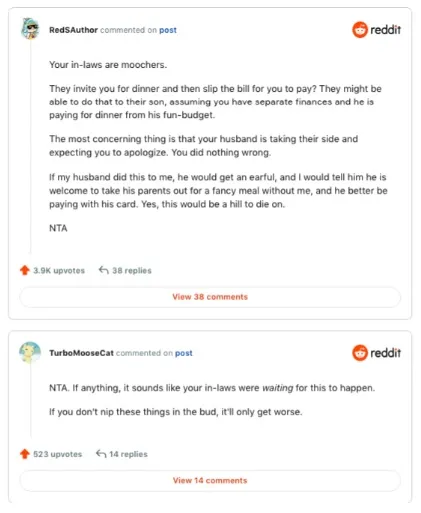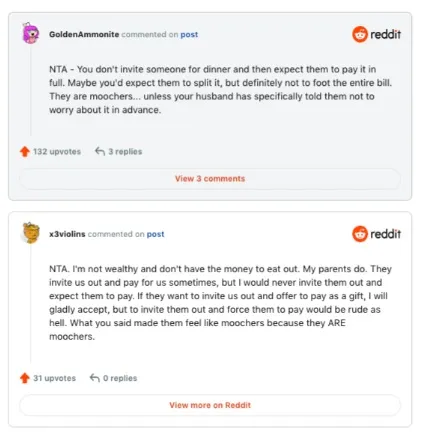When Fine Dining Turns Awkward: In-Laws Invite Us to an Expensive Restaurant, Only to Pass the Bill to My Husband and Me
Emma, a 37-year-old woman, and her 40-year-old husband, Mark, once called a small suburban town their home. Embracing their status as amateur foodies, the couple explored various unconventional restaurants, fueled by their shared love for culinary adventures. Blessed with financial comfort, they occasionally invited Emma’s in-laws to join them for dinner, happily offering to cover the expenses.

Over time, Emma noticed a recurring pattern that raised concerns. It became an unspoken expectation that she and Mark would foot the bill for outings with her in-laws. The breaking point occurred during an extravagant dinner at a high-end restaurant when her mother-in-law casually handed the bill to Mark.
Feeling a blend of embarrassment and frustration, Emma resolved to address the issue. When her husband, Mark, mentioned a work achievement that seemed deserving of celebration, her in-laws suggested another upscale restaurant for the occasion. This prompted Emma to confront the ongoing financial dynamic.

In a moment of heightened tension and fearing for their financial well-being, Emma exclaimed, “Who’s paying?” Her seemingly innocent question set off a chain of events that would strain the relationships among family members.
Caught between comprehending his wife’s perspective and maintaining loyalty to his parents, Emma’s husband tried to ease the situation. However, Emma stood her ground, expressing her frustration with the ongoing expectation that they foot the bill for every family meal. She argued against exploiting her award ceremony as justification for yet another expensive night out. This marked a pivotal moment testing the dynamics within the family.

Amidst rising tensions, Emma’s husband sought to defend his parents by highlighting the wealth disparities between the two families. Feeling the strain, he suggested going to the restaurant his parents had chosen in an attempt to diffuse the situation.
However, Emma, resolute and unwilling to concede, suggested an alternative solution. She proposed that both families join in celebrating her in-laws’ anniversary at a upscale restaurant. The in-laws, eager to proceed with lunch immediately, were not receptive to the idea of sharing the cost. This further heightened the disagreement over who should bear the financial burden of the family outings.
Frustrated, Emma turned to Reddit to seek advice from the online community. The responses varied, but a majority encouraged her to stand firm in her position. The support she received online had a profound impact on Emma’s husband, making him realize the impracticality of his parents’ expectations. This revelation marked a significant turning point in their understanding of the situation.

Recognizing the need for boundaries, Emma’s husband apologized to her, acknowledging the importance of setting limits. In response, Emma offered her apologies for any unintended harm caused during the argument. In an effort to ensure both families could enjoy the celebratory event, they reached a compromise. They decided to postpone the celebration feast until the in-laws’ anniversary, fostering a more equitable and harmonious solution.

In the end, Emma and Mark made a firm decision to decline further invitations, emphasizing the importance of maintaining their financial boundaries and upholding mutual respect in their relationships. While the quarterly meals with the in-laws continued, this decision marked a pivotal step in asserting their autonomy and preserving a healthier dynamic within the family.




